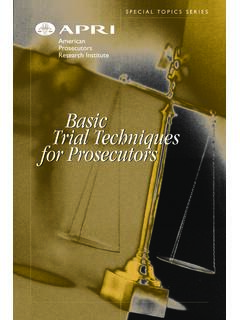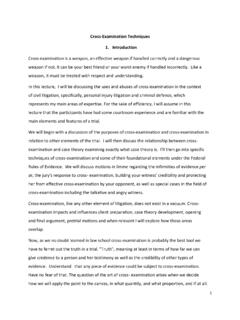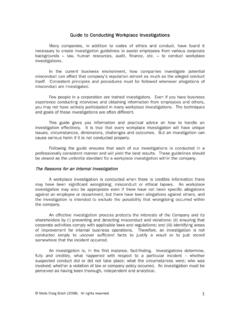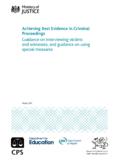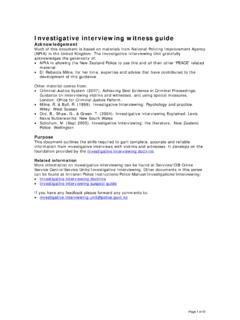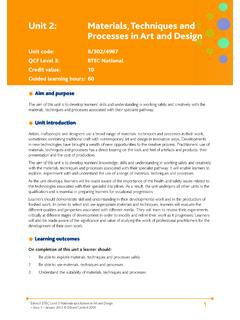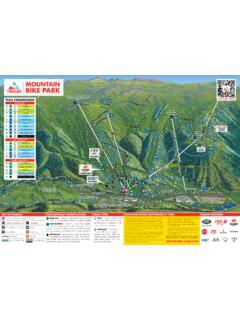Transcription of Cross-Examination
1 Cross-Examination For ProsecutorsThe National Traffic Law Center is a program of the National District Attorneys Association. This document was prepared under Cooperative Agreement Number DTNH22-05-H-05166 from the Department of Transportation National Highway Traffic Safety Administration. Points of view or opinions in this document are those of the authors and do not necessarily represent the official position or policies of the Department of Transportation, NHTSA, or the National District Attorneys Table of Contents INTRODUCTION .. iii ACKNOWLEDGEMENTS .. iv PREFACE .. v OBJECTIVES FOR CROSS-E XAMINATION .. 1 PREPARATION ..2 Reviewing the case file .. 2 Interviewing all witnesses .. 3 Visiting the scene .. 3 Anticipating the defense .. 4 METHODS OF Cross-Examination .. 6 Gaining Concessions.
2 6 Reiterating and Emphasizing Facts .. 7 New Facts .. 8 Alternative Facts .. 8 Deleted Facts .. 9 Mistakes .. 9 Impeaching a witness .. 10 Bias .. 10 Perception and Recall .. 10 Lack of Personal or First Hand Knowledge .. 12 Competency .. 13 Physical Evidence .. 14 Inconsistencies .. 14 Prior Inconsistent Statements .. 15 Prior Consistent Statements .. 16 Behavioral Inconsistencies .. 16 Lack of Corroboration .. 16 Prior Bad Acts .. 17 Character and Credibility .. 17 Criminal Convictions .. 17 CONTROLLING Cross-Examination .. 18 Form of Questions .. 18 Order of Questioning .. 19 Cross-Examination OF THE EXPERT witness .. 19 Identifying the Expert Opinion and the Basis for It .. 20 Research the witness s Background .. 21 Research the Science .. 22 Challenging Expertise .. 23 Impeachment of an Expert witness by Prior Inconsistent Statements.
3 24 Impeachment Using an Article Written by the witness .. 26 Countering Escape and Evasion Techniques .. 27 CONCLUSION ..28 ii EXPERT witness ADDENDUM .. 29 Medical Experts .. 29 Collision Reconstructionists .. 29 APPENDIX .. 33 Resources and References .. 33 General Resources ..33 Medical Expert Resources .. 33 Administrative and Federal Procedure .. 34 Crash Reconstruction Resources .. 34 Suggested Reading .. 34 Other Publications Available From the National Traffic Law Center .. 35 iii INTRODUCTION Cross-Examination is an art form only occasionally practiced by prosecutors, who instead necessarily focus much of their efforts on direct examination. This is brought on by the prosecution bearing the burden of proof and the simple realities of many criminal trials where the defense may choose to present few or no witnesses.
4 DUI cases, however, are often complex and more scientific or technical in nature than many other types of criminal cases. Accordingly, the prosecutor s opportunity to conduct a Cross-Examination , particularly of an expert witness , is greater. This monograph was developed to assist prosecutors in understanding the basic goals, methods, and forms of Cross-Examination when dealing with all witnesses. In addition, the monograph provides guidance specific to expert witnesses. The National Traffic Law Center previously published Basic Trial Advocacy for Prosecutors, thanks to a contribution from a charitable foundation, discussing such trial advocacy topics as pre-trial preparation, voir dire, opening, direct examination, Cross-Examination and closing argument. In addition, the National Traffic Law Center created a DWI Prosecutor s Handbook, in collaboration with the National Highway Traffic Safety Administration and various vehicular crime prosecutors and experts from across the country.
5 This monograph covers such topics as case evaluation and review, trial preparation, and common defenses and challenges. Both monographs may be obtained by contacting the National Traffic Law Center of the National District Attorneys Association at or 703-549-9222. For the purposes of this publication the terms DUI (driving under the influence), DWI (driving while intoxicated or impaired) and OUI (operating under the influence) are considered interchangeable for the purposes of this publication. iv ACKNOWLEDGMENTS This guide was created by the National Traffic Law Center of the National District Attorneys Association and is the result of a collaborative effort of the following traffic safety pr ofessionals: James Camp, Tennessee Traffic Safety Resource Prosecutor Erin Inman, Montana Traffic Safety Resource Prosecutor Joanne E.
6 Michaels, Program Director, National Traffic Law Center of the National District Attorneys Association Mark M. Neil, Senior Attorney, National Traffic Law Center of the National District Attorneys Association Deena Ryerson, Oregon Traffic Safety Resource Prosecutor Kristen K. Shea, Senior Attorney, National Traffic Law Center of the National District Attorneys Association John E. Sullivan, III, Rhode Island Traffic Safety Resource Prosecutor Brian Chodrow, Program Analyst, Impaired Driving Division, National Highway Traffic Safety Administration, served as the Contracting Officers Technical Representative for this project. v PREFACE Effective Cross-Examination is a critical part of any criminal trial. Never is this more true than when technical or scientific evidence is a central issue for the jury.
7 With this being said, prosecutors often feel uncomfortable during Cross-Examination of defense witnesses. This is not due to lack of ability. Rather, it is caused by insufficient practice, focus, and preparation for this part of the trial. As prosecutors, we generally expend most of our effort on proving our case in chief and experience a feeling of relief when the prosecution rests. In reality, the State s case is far from over at the end of the State s presentation of evidence. The simple message is that case preparation includes preparing to overcome any defense theory because it is often when the State s case ends that the most difficult work, Cross-Examination of the defense witnesses, begins. In order to succeed at Cross-Examination , a prosecutor must understand the goals of each party in a criminal trial.
8 This allows a prosecutor not only to block the defense tactics, but also to use skillful questioning of defense witnesses to illicit responses favorable to the State. The goal of the defense during trial is to cast doubt in the minds of the jury on behalf of their client. This goal can be accomplished in several ways: (1) minimize the State s case through pretrial motions to suppress evidence; (2) minimize the State s case through the Cross-Examination of State s witnesses; (3) minimize the State s case by calling their own witnesses to present evidence for the jury and (4) bombard the jury with enough technical or scientific testimony to cause confusion. Any of these methods, if unchallenged, can result in the creation of reasonable doubt. Effective prosecution, at its core, the means presenting sufficient evidence to convict a defendant of the crimes charged through direct evidence.
9 Keeping this goal foremost in mind allows a prosecutor to focus more on the case-in chief. Often a prosecutor will not even know if the defense will present evidence until after the State rests. At that point, skilled and effective Cross-Examination of the defense witnesses becomes critical for a prosecutor. He or she will work through Cross-Examination of any defense witnesses with two core goals. The primary goal is preserving the integrity of the State s case and the secondary goal is to obtain any favorable facts, concessions or inconsistencies possible. While a prosecutor should not plan on winning the case through Cross-Examination of defense witnesses, a poorly planned or executed Cross-Examination could impact the success of the case and the prosecutor s credibility with the jury. A well-prepared prosecutor can both obtain helpful factual admissions supporting the State s case from the defense witnesses and minimize the defense case through impeachment of the defense witnesses.
10 This monograph is intended to assist prosecutors in successful Cross-Examination . Careful consideration and adherence to the thoughtful strategies contained within will increase the chances of the desired outcome, a verdict of guilt. With time and practice, any prosecutor can become a master of the art of Cross-Examination . No matter how natural a seasoned prosecutor s Cross-Examination skills may appear, it took years of training and experience to become truly proficient. 1 OBJECTIVES FOR Cross-Examination When a prosecutor takes a case to trial, the primary goal is always a conviction. To achieve this end, prosecutors will have specific objectives and goals for each portion of the trial. Before beginning any work on Cross-Examination , a prosecutor needs to carefully consider his or her objectives for each witness that will be presented.

